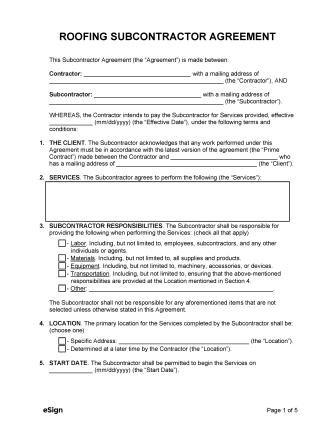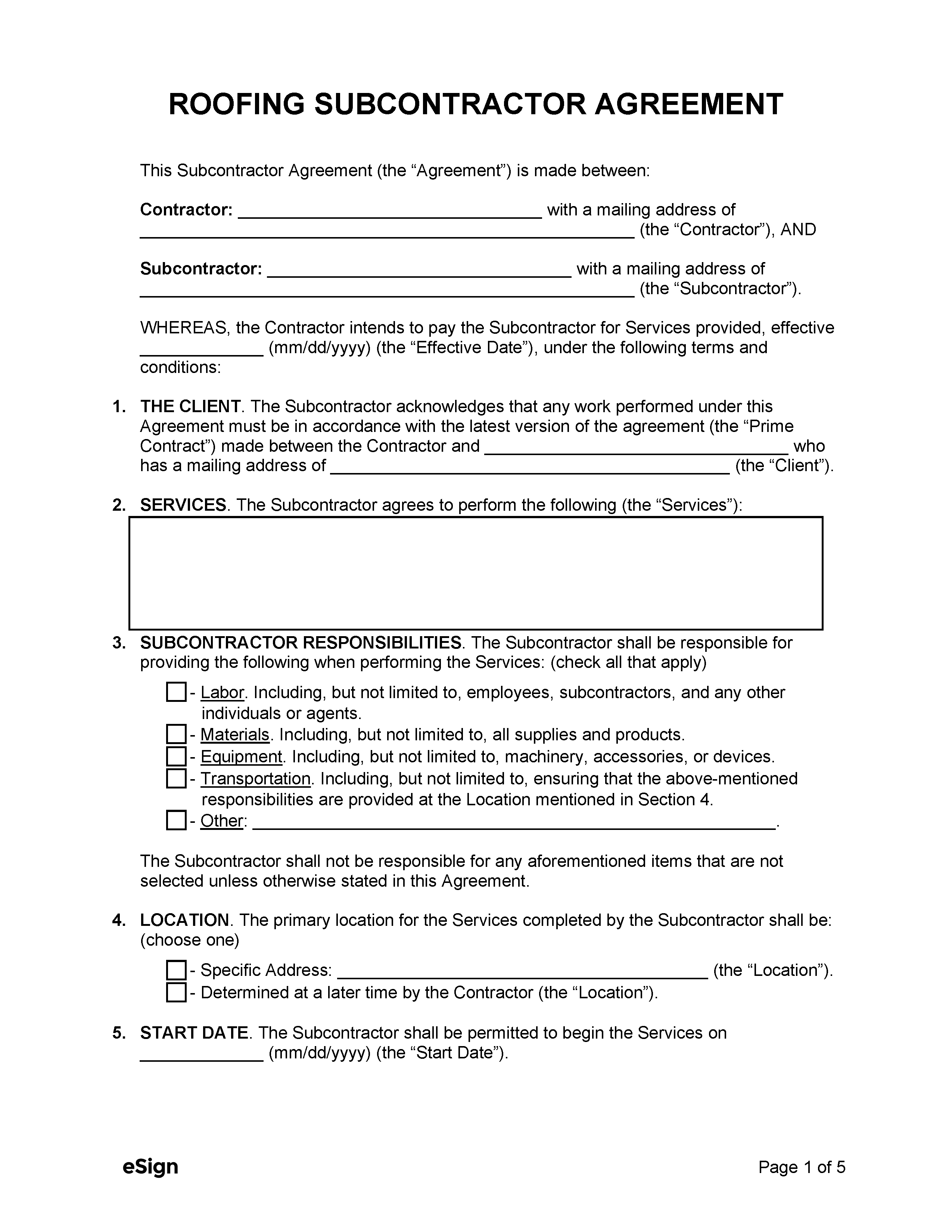Roofing License Requirements
Many states require individuals to obtain licensing, certification, or registration to work legally as roofers and roofing insurance to keep the license valid.
Benefits of a Roofing Subcontractor Agreement
When a contractor requires several workers, suppliers, and subcontractors to assist on a large project, entering into legal, written agreements will remove unnecessary risk and liability.
If one of the parties does not adhere to the agreement, having the terms and conditions in writing may allow the injured party to seek damages so their business and livelihood are not negatively affected.
When entering into a roofing subcontractor agreement, the subcontractor is considered an independent contractor. Defining contractor status makes it clear that neither the contractor nor the client is the roofer’s employer, and therefore they’re not responsible for insurance, benefit plans, laborers, equipment, or social security.
Sample
Download: PDF, Word (.docx), OpenDocument
ROOFING SUBCONTRACTOR AGREEMENT
1. THE PARTIES. This Subcontractor Agreement (the “Agreement”) is made between [CONTRACTOR NAME] with a mailing address of [CONTRACTOR ADDRESS] (the “Contractor”) and [SUBCONTRACTOR NAME] with a mailing address of [SUBCONTRACTOR ADDRESS] (the “Subcontractor”).
WHEREAS, the Contractor intends to pay the Subcontractor for Services provided, effective [MM/DD/YYYY], under the following terms and conditions:
2. THE CLIENT. The Subcontractor acknowledges that any work performed under this Agreement must be in accordance with the latest version of the agreement made between the Contractor and [CLIENT NAME], who has a mailing address of [CLIENT MAILING ADDRESS] (the “Client”).
3. SERVICES. The Subcontractor agrees to perform and be responsible for the following: [LIST SERVICES] (hereinafter the “Services”).
4. RESPONSIBILITIES. The Subcontractor shall be responsible for providing the following when performing the Services: [LIST RESPONSIBILITIES]
5. LOCATION. The primary location for the Services completed by the Subcontractor shall be [ADDRESS].
6. START & END DATES. The Subcontractor shall be permitted to begin the Services on [MM/DD/YYYY] and shall complete the services in a reasonable time period in accordance with industry standards.
7. PAYMENT AMOUNT. Payment for the Services shall be as follows: [COMPENSATION (e.g., $30/hr)]. Payment shall be made by the Contractor to the Subcontractor as follows: [PAYMENT FREQUENCY (e.g., weekly paid on Friday)].
8. TERMINATION. During the course of this Agreement, either party can terminate this agreement by providing [#] days’ notice to the other party.
9. SUBCONTRACTING. The Subcontractor shall (☐ Have | ☐ Not Have) the right to Subcontract, either in part or in whole, the Services authorized under this agreement.
10. RESOLUTION OF DISPUTES. If a dispute arises concerning the provisions of this Agreement or the performance of any of the parties mentioned, the parties hereby agree to settle the dispute by equally paying for binding arbitration as regulated under the laws in the state where the Services are being performed.
11. INSURANCE. The Subcontractor agrees to bear all responsibility for the actions related to themselves and their employees or personnel under this Agreement. In addition, the Subcontractor agrees to obtain comprehensive liability insurance coverage in case of bodily or personal injury, property damage, contractual liability, and cross-liability.
12. REQUIRED LICENSES. All parties of this Agreement, including, but not limited to, the Contractor, the Subcontractor, other subcontractors, and all parties’ direct or indirect employees and agents, shall be licensed in accordance with respective state laws where the individual is performing their trade or service. All individuals under this agreement shall be regulated by their respective licensing board, which has jurisdiction to investigate complaints made by any third (3rd) parties.
13. INDEMNIFICATION. The Subcontractor shall indemnify and hold the Contractor and Client harmless from any loss or liability from performing the Services under this Agreement.
13. INDEPENDENT CONTRACTOR. No term, covenant, condition, or provision of this Agreement shall be considered to create an employer and employee relationship. All parties to this Agreement attest that the relationship between the Contractor and the Subcontractor shall be recognized as the Subcontractor acting as an independent contractor.
IN WITNESS WHEREOF, this Agreement was signed by the parties under the hands of their duly authorized officers and made effective as of the undersigned date.
Contractor Signature: _____________________ Date: [MM/DD/YYYY]
Print Name: [CONTRACTOR NAME]
Subcontractor’s Signature: _____________________ Date: [MM/DD/YYYY]
Print Name: [SUBCONTRACTOR NAME]

